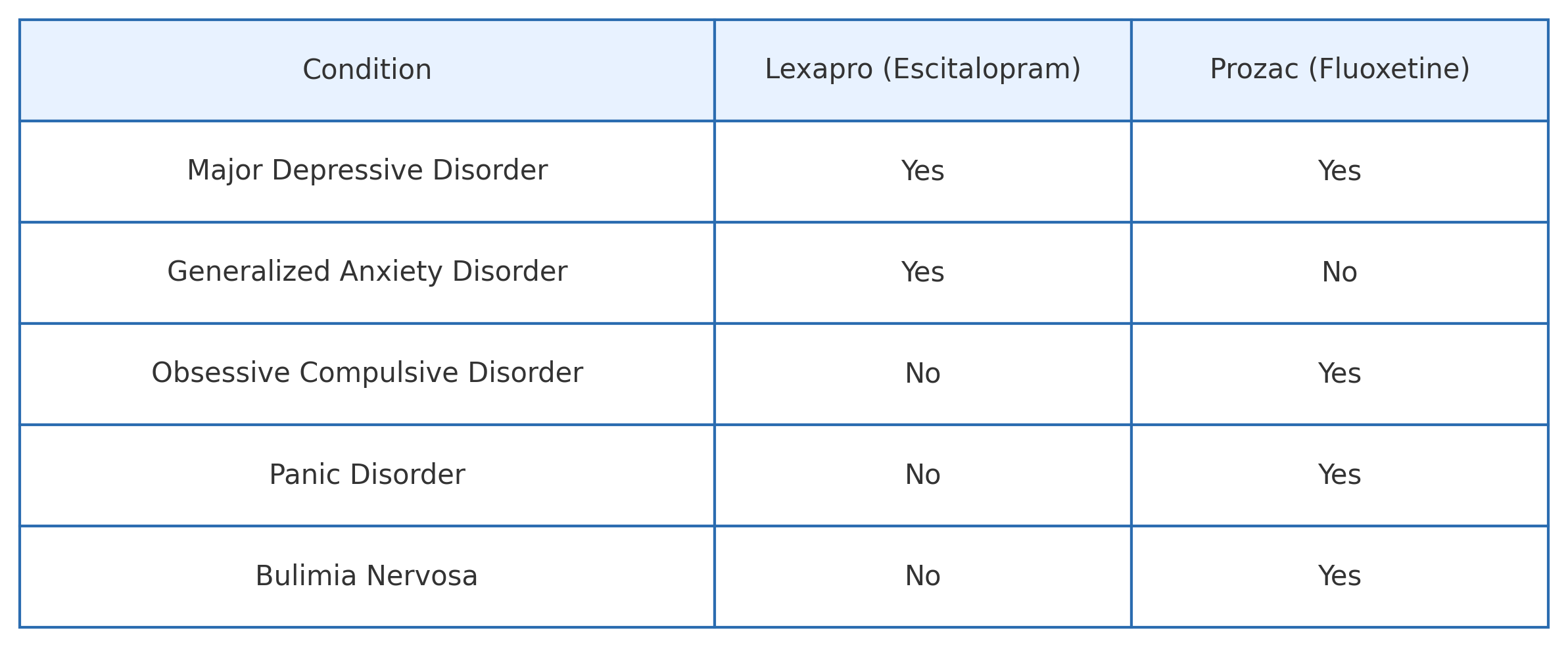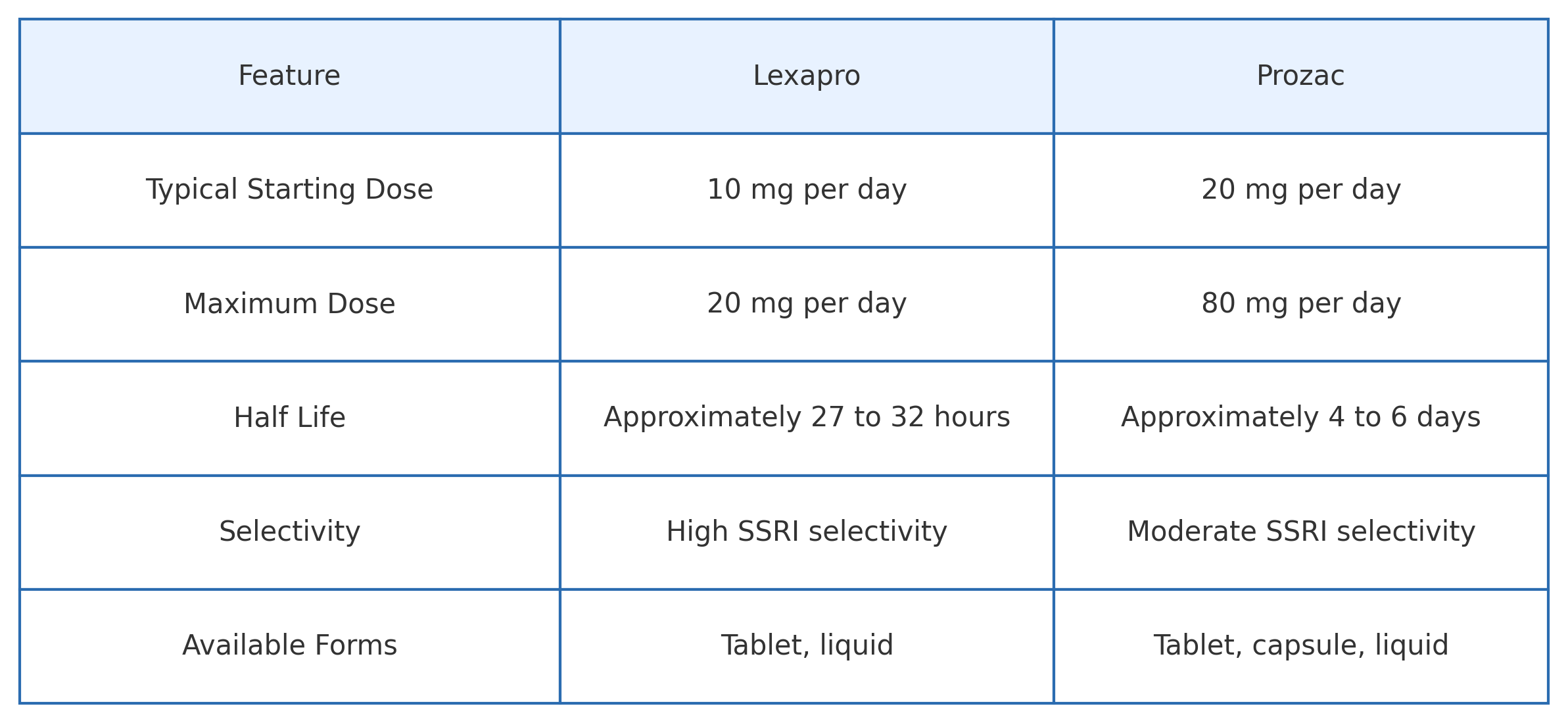
Choosing between Lexapro vs Prozac can feel challenging when you are trying to manage depression, anxiety, or other mental health concerns. Both medications belong to the SSRI category, which stands for Selective Serotonin Reuptake Inhibitors, and both have strong evidence supporting their use. However, they differ in important ways, including the conditions they treat, how long they remain in the body, and the types of side effects patients may experience. Understanding the difference between Prozac and Lexapro can help you make a more informed decision when working with a doctor or licensed mental health provider.
Antidepressants can be life changing for many people, and learning more about Prozac compared to Lexapro is a meaningful first step in finding the right treatment. This guide breaks down how each medication works, where they overlap, where they differ, and which one may be a better fit based on your symptoms, medical history, and treatment goals.
What Are Lexapro and Prozac?
Lexapro, also known by its generic name escitalopram, is an SSRI commonly prescribed for depression and generalized anxiety disorder. It works by increasing serotonin levels in the brain, which helps regulate mood and decrease anxious thoughts. Many people find that Lexapro has a calming effect, which is why it is often selected for anxiety disorders.
Prozac, also known as fluoxetine, is another SSRI used for a broader range of mental health conditions. Prozac or Lexapro may both be helpful for depression, but Prozac is also approved for obsessive compulsive disorder, panic disorder, and bulimia nervosa. Prozac has been available longer and has one of the longest half-lives of all SSRIs, which means it remains in the body for several days after a person stops taking it.
Some people wonder what is the difference between Lexapro and Prozac or whether Lexapro and Prozac are the same. While both increase serotonin, their chemical structures and therapeutic profiles are not identical. This explains why certain individuals respond better to one medication over the other.
Key Differences Between Lexapro and Prozac
Although both medications belong to the SSRI family, their uses, dosages, and side effect profiles differ. If you are considering switching from Lexapro to Prozac or vice versa, these distinctions may help guide the conversation with your clinician.
Conditions Treated
Lexapro is most commonly prescribed for major depressive disorder and generalized anxiety disorder. Its strong calming effect makes it especially effective for persistent worry, muscle tension, nervousness, and difficulty relaxing.
Prozac is approved for major depressive disorder but also for a wider range of diagnoses, including obsessive compulsive disorder, panic disorder, and bulimia. This broader approval may make Prozac more suitable for individuals with overlapping symptoms, such as intrusive thoughts combined with panic attacks.
Conditions Treated

When evaluating Lexapro versus Prozac, consider the specific symptoms you want to address. Your doctor may choose Lexapro for anxiety-related symptoms, or Prozac for compulsive behaviors or panic attacks.
Dosage and How They Work
Lexapro is known for being one of the more selective SSRIs. Higher selectivity can sometimes result in fewer side effects because the medication targets serotonin pathways more precisely.
Prozac stays in the body for a longer time because of its extended half-life. This characteristic can be beneficial for people who struggle with missed doses, since the medication remains active longer. However, the long half-life also means that Prozac can take more time to discontinue or switch away from compared to Lexapro.
Typical starting doses differ between the medications.

These differences influence how quickly a patient may notice improvements, how long it takes for the medication to leave the body, and how smoothly transitions between medications can be managed.
Effectiveness and How Long They Take to Work
Both Lexapro and Prozac typically take 4 to 6 weeks to reach full therapeutic effect. Some people notice improvements within the first two weeks, such as better sleep, reduced irritability, or small shifts in motivation. The full mood lifting and anxiety reducing effects usually appear later.
Prozac may take additional time to clear out of the system due to its long half-life. This can be beneficial for long term stability, but it also requires more planning when discontinuing the medication or when switching from Lexapro to Prozac or from Prozac to another prescription.
Common Side Effects
Side effects vary from person to person, and many symptoms improve with time as the body adapts. Lexapro is often considered slightly more tolerable due to its selectivity, while Prozac is known for energizing effects, which can be helpful for some patients and uncomfortable for others.
Common Side Effects of Lexapro
- Nausea
- Fatigue or drowsiness
- Mild weight gain
- Dry mouth
- Decreased sexual interest
Common Side Effects of Prozac
- Insomnia
- Feeling restless or agitated
- Headaches
- Sweating
- Weight loss
When to Contact a Doctor
Seek medical attention if you experience:
- Suicidal thoughts
- Severe agitation
- Serotonin syndrome symptoms such as confusion, rapid heartbeat, or fever
- Severe allergic reactions
- Sudden or intense mood changes
Keeping track of symptoms and sharing them with your clinician allows them to adjust the dose or explore alternatives.
Drug Interactions and Warnings
Both medications can interact with other substances. Combining Prozac or Lexapro with certain drugs can increase the risk of serotonin syndrome, which is a serious medical condition caused by excessive serotonin activity.
Avoid combining these medications with:
- Monoamine oxidase inhibitors
- Certain migraine medications
- NSAIDs when used frequently
- Alcohol in large amounts
Always tell your doctor about every medication and supplement you take before starting a new prescription.
Lexapro versus Prozac: Which One Is Better for You?
There is no universal answer to the question is Prozac better than Lexapro or is Lexapro stronger than Prozac. The best choice depends on your symptoms, your medical history, and how your body responds to treatment.
When Lexapro May Be a Better Fit
Lexapro may be ideal for:
- Anxiety disorders
- Moderate depression
- Individuals sensitive to stimulating side effects
The calming profile of Lexapro can help people who experience excessive worry or tension.
When Prozac May Be a Better Fit
Prozac may be more effective for:
- OCD
- Panic disorder
- Bulimia
- Long term treatment needs
Prozac is generally energizing, which can benefit individuals with low motivation or certain types of depression.

Personal factors such as age, lifestyle, sleep patterns, past medication reactions, and coexisting health conditions all influence the choice between Lexapro vs Prozac. A licensed professional can guide you through these details and help determine the best option.
Summary
Both Lexapro and Prozac are effective antidepressants that help regulate serotonin and improve mental health. They share similarities as SSRIs, but their approved uses, side effects, and durations in the body differ. Lexapro is typically preferred for anxiety and depression, while Prozac is often recommended for OCD, panic disorder, bulimia, and long term treatment planning. If you are unsure which medication to choose, speak with a licensed psychiatrist who can evaluate your symptoms and medical history.
For ongoing support, Mindful Care offers resources to help you explore treatment options. You can learn more about online therapy for depression at https://www.mindful.care/conditions/major-depressive-disorder-depression, explore bipolar treatment at https://www.mindful.care/conditions/bipolar, or schedule a virtual psychiatrist appointment at https://www.mindful.care/ongoing-care.
Not sure which medication is right for you? Consult a licensed psychiatrist today. Looking for personalized treatment? Get a free consultation with a mental health expert.





